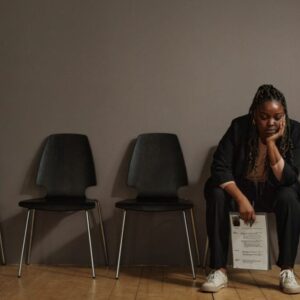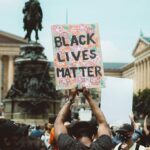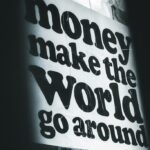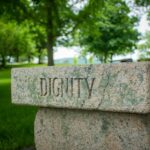
A note from Marcus Littles: The experiences of Black women and gender-expansive leaders in the sector have rightfully been a focus of research and commentary on systemic racism, unfair expectations, and funding gaps that Black women face when pursuing transformation. Leaders and funders must continue to uplift stories and data about Black women’s leadership and invest in Black women change agents.
However, in my estimation, the experiences, challenges, and visions of Black male leaders have been underexamined. Doing this work requires examining how Black men can dismantle internalized patriarchy. This poses challenging questions, such as:
- Why are Black men who are considered successful at increased risk of discrimination and depression?
- What does it look like for Black men to amplify and elevate Black women in leadership?
- How can Black men share in the care work that liberation requires?
- How can we find the freedom to dream?
I invited two exceptional Black male nonprofit leaders to delve into these and other questions—Michael Partis, executive director of the Red Hook Initiative, a community-based nonprofit in Brooklyn, NY; and Marcus Pope, president of the Minnesota youth advocacy organization Youthprise. Our conversation is below.
Marcus Littles: Can you describe your career trajectories and how they have been impacted by your identities and commonly held perceptions of Black men in the sector?
Michael Partis: As a cisgender Black leader in this work, I’ve recognized that I’m a care worker first. Not an executive or manager or thought leader. That is perhaps not a common perception of Black masculinity or excellence, but I am clear that I am a care worker first, so I am constantly wrestling with how I model care. I take care seriously.
Strategy with empathy is essential for people of African descent in the social sector, where there’s a history of Black people being overburdened and overworked. Balancing care and strategy with empathy requires us to believe that the sum is greater than the parts.
We know that social change work is hard, but that doesn’t mean leaders should run our people ragged. We don’t have the moral license to run them into some stereotypical notion of hard work. As a Black male leader, I’m constantly seeking to be reflective and trying to extend care to others and myself.
“I see my success and progress in the nonprofit sector as a form of resistance. I also have a responsibility to pave the way for younger Black males.”
Marcus Pope: My upbringing and the lessons I learned about being a Black man in society have deeply influenced my leadership style and career development. Much of what Michael said about care resonates with me. My parents, who grew up in the Deep South during Jim Crow, did not sugarcoat the challenges associated with being a Black male in society. I remember vividly the concern my mother consistently expressed about my safety. Hard work and persistence were emphasized, and it was understood that my margin for error was limited.
I was reared to maintain composure amid risks and barriers; and within a society that had low expectations of me.
As early as kindergarten, teachers and the education system didn’t expect me to be able to read, write, or do math, and they told my parents that I wasn’t capable. Black men have consumed this narrative about our lack of capacity throughout childhood and adolescence, particularly as it relates to our intellectual and professional abilities.
My career trajectory and leadership model have always pushed against that. As I have secured credentials and reached career milestones, I am constantly reminded of those who paved the way and others who were brilliant, but society did not allow them to reach their potential as Black men. I see my success and progress in the nonprofit sector as a form of resistance. I also have a responsibility to pave the way for younger Black males who are fully capable yet face barriers within the sector.
ML: What do different or new narratives around Black men and care work in the nonprofit sector look like? And what does it mean to lead an organization that contributes to reshaping narratives around Black men as care workers?
Pope: I wonder how we normalize the notion that Black manhood can include choosing a profession that cares for people and makes a difference in their lives. That’s something that we don’t talk about when we discuss Black manhood. So many narratives dissuade Black men from jumping into these careers.
“My leadership should model, particularly to Black men, leadership not constrained by the weight of White-dominant models.”
Operating within the nonprofit sector without that savior orientation means challenging those who believe their work is to “save poor Black and Brown children.” It’s challenging to secure investment when many donors are still operating within a savior framework while you’re within a framework of honoring the community’s potential and expertise. I think that many Black, Indigenous, and other people of color as well as allies in the sector are still trying to shift the default orientation of White saviorism.
Partis: I agree. At a high level, we have to embrace the idea there are no saviors. We all have a role. We all have a place. We all have to contribute. Part of organizing is helping people see a place for themselves—where they can lead, support, and be part of something. My leadership should combat the widely held beliefs in this sector of saviorism. My leadership should model, particularly to Black men, leadership not constrained by the weight of White-dominant models.
Our leadership should design with intention, letting go of the notion that one big brain with a brilliant idea makes change happen. That is not the leadership trajectory we aspire to, nor the narratives for Black male leadership that we seek to advance.
ML: You are both offering a reframe of Black male leadership not anchored in White supremacy. So, how do Black male leaders in the sector ensure that we are combating patriarchy and not mindlessly (or consciously) beneficiaries of it? How do you seek to invest in the leadership of Black women and gender-expansive folks through your leadership?
Pope: I’ve been at Youthprise for over 13 years. I spent 10 years under the leadership of a Black woman—our organization’s first president, Wokie Weah—and that was an intentional choice. Throughout my career I have witnessed several situations where Black women are in transitional leadership roles where they are cleaning up a mess; or set up to be a scapegoat for someone else’s mess. In some instances, they do not know who to trust and have limited support. Every leader needs a good, dependable deputy and that is a role I sought to play under her leadership.
Now that I hold the most senior leadership position at Youthprise, I cherish the role I played supporting a Black woman leader. I learned so much from her leadership and it has enhanced my ability to lead. Sometimes, we buy into patriarchy and that the only way to lead is to assume the highest position within an organization. This narrative leads to missed opportunities to support Black women in leadership.
Partis: The Red Hook Initiative employs 35 people, roughly seven men. When we say representation is everything, this is what we’re talking about. Much of our work is with our young people and community around challenging misogynoir, challenging gender roles, interrogating what they know and don’t know, what they realize and don’t realize. We’re doing so from a place of applied practice, aiming to disrupt those models in our organization. Past students have been shocked to see me lead the organization. Simply being in these roles allows people to see different models of male leadership and what it looks like to lead responsibly and equitably, rooted in our relationships and interactions with everyone in our community. It’s vital for us, and for me, to model that.
ML: I really appreciate the two of you and your brilliance, heart, and commitment to care work. In Freedom Dreams: The Black Radical Imagination, historian Robin D.G. Kelley says, “Without new visions, we don’t know what to build, only what to knock down. We not only end up confused, rudderless, and cynical, but we forget that making a revolution is not a series of clever maneuvers and tactics, but a process that can and must transform us.”
Can you discuss how your freedom dreams guide your leadership and work?
Pope: Half of our board is young people. They push me to dream in important ways. Weah always said, “Young people are the keepers of the dreams, and elders are the keepers of the memories.”
When you do this work, you become more entrenched in the thinking of the dominant culture and sometimes don’t realize how it influences you. When you’re leading an organization, and have to raise millions of dollars, you can get stranded in the water and need someone to pull you out of it to be able to dream. This sector entrenches you in ways of being and operating that run counter to the change we want to see in the world. Having young people engaged in our board, leadership, and governance has challenged me. I don’t always agree with their perspective, but it also helps me dream about the possibilities for our world and society. They inspire and push me to be bold and courageous.
Partis: There are so many existential threats. Cash flow, payroll, and rising employer contribution costs to health insurance—it all can feel overwhelming. Sometimes, it’s taken the staff to remind us to reject the pressure to concede to the market and instead say, “Let’s create some space and let’s dream big. Let’s not succumb or give in to these other types of pressures.” Trusting your people and having people who will remind you to dream around you is really important.
Luckily, dreaming is part of our model. Every quarter or so, I also give myself space to map out my dreams—not my goals, but my dreams. It’s a simple practice: just me and my iPad, which is somewhat like a dream journal. I’m trying to encourage my staff to have that space, too. Yes, the reality is we lack funding from the dominant donor and funder class to create the space to dream. We have to do it anyway.
Recently, I’ve focused on finding funders willing to dream with us and share our vision. There will always be people who underestimate what is possible. However, dismantling racism and inequality requires investment in dreams, risk, imagination, and vision. Not everyone will do that. So, it’s our job as leaders to invest in our own spaces to dream.
“Having young people engaged in our board, leadership, and governance has challenged me….They inspire and push me to be bold and courageous.”
ML: Who are your leadership models? What lessons do you carry into your work?
Partis: I had a track coach in high school, Brunelle Griffin, Coach Griff. He taught us about accountability and care. He was somewhat like a social worker, displaying a masculinity rooted in assertiveness, confidence, and love. When I graduated, he gave me a copy of The Souls of Black Folk by W.E.B. Du Bois.
My mentor, Bill McKinney, the executive director of New Kensington Community Development Corporation (NKCDC), is another. I learned a lot from Bill. He’s taught me to be analytical and emotionally intelligent. He showed me the importance of lifelong learning—and how critical research and evaluation are to this work.
But it started with my grandma. She taught us to treat people how we wanted to be treated and that the best way to show people how to act is by not acting like them. I don’t have a petty bone in my body, and my grandmother is the reason for that.
Pope: One of the common characteristics around the leaders I admire is their thick skin. Many Black male leaders during their day were criticized, ridiculed, and challenged. They’re revered now and understood more fully, but oftentimes, when you’re in the moment as a leader, it’s difficult, messy, and you’re not always fully appreciated. That understanding is something I’ve gained from studying the leadership of Black activists.
Another model of leadership for me is from my predecessor, Weah, with whom I worked for nearly a decade. There are decisions I must now make that help me understand what she carried.
There are too many elders and leaders to name who I honor and whose leadership I mirror. I had a grandmother who lived until I was in my twenties. She was born in 1914 and had an eighth-grade education but a lot of wisdom. She was one of the smartest people I have ever known. The role she played in my life has undoubtedly influenced my view of expertise and knowledge. There are lessons and values from her life story and teachings that guide me daily in my professional role. It’s the practical wisdom that comes from generations of folks that got us to where we are now.














